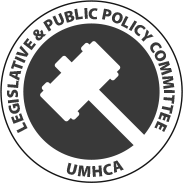
UMHCA Legislative Updates April 2023
UMHCA’s Legislative & Public Policy Committee (LPPC) was extremely active during the recent legislative session and continues to advocate for our profession year-round both in Utah and nationally. This year some major legislative changes occurred and we want you to understand the impact of these changes in your work and professional development. Please reach out to lppc@umhca.org if you have any questions and if you would like your voice heard as we prepare for the 2024 legislative session and continue to work with legislators join our committee!
House Bill 166
The Utah Legislature passed House Bill 166 which amends the Mental Health Professional Practice Act that governs the licensing for Associate Clinical Mental Health Counselors (ACMHCs). The amended act has two primary provisions:
- ACMHCs hours required for direct supervision with an approved supervisor have been reduced from 100 hours to 75 hours
- The minimum time requirement of two years prior to obtaining full licensure has been eliminated, DOPL is adding a rule to an 18-month time frame
HB 166 Impact for ACMHC’s
Decreasing the supervised practice time to less than 2-years and 75 supervision hours is one of the lowest standards for full licensure in the United States. ACMHCs and ACMHC supervisors should be aware of the following:
- Supervisors are not required to sign off to recommend full licensure for any ACMHC who has not demonstrated the ability to practice competently and ethically. This is an ethical and liability responsibility of the supervisor to protect the safety and health of the public.
- Supervisees may request more time with supervised practice from their supervisor if they do not yet feel prepared for independent practice.
- ACMHCs should be aware that if they apply for full licensure before two years or with less than 100 hours of supervision (de facto national standards) there may possibly be untended consequences. Currently, it is likely that this decrease may impact the ability to be eligible to bill for Medicare reimbursement and commercial insurance, participation in the Counseling Compact, Privilege to Practice, and portability of licensure to other states.
-
- Medicare Reimbursement: The Federal Mental Health Access Improvement Act (H.R.432) passed by Congress allows Marriage and Family Therapists (MFTs) and Mental Health Counselors to be reimbursed under Medicare. The Centers for Medicare & Medicaid Services (CMS) will establish the rules and requirements for those eligible to bill for Medicare reimbursement for both those over 65 and those with Medicare eligibility disabilities. The current draft indicates that CMHC’s eligible to be Medicare providers must have 2-years of supervised practice. The rules will be established this year so that the law can be implemented on January 1, 2024.
- The Counseling Compact has been passed in Utah and several other states. The Counseling Compact Commission this year is likewise establishing the rules and requirements for fully licensed Clinical Mental Health Counselors to participate in the Privilege to Practice across state lines. It is likely that some states will require 2-years of supervised practice.
- To be eligible and paneled with Tricare 100 hours of supervision and 2-years of supervised practice are required.
- Many states require 2 years of supervised practice prior to full licensure. If you are considering relocating or becoming licensed in another state, UMHCA recommends that you contact the licensing body of that state.
Supervisor Considerations. Supervisors of ACMHCs should review the ethical and legal liabilities for approving full licensure for any individual who is not fully qualified to practice competently and ethically. Supervisors are not under any state injunctions to prematurely approve ACMHCs if there are public health or safety concerns. Supervisors should also consider completing a supervisor training program.
HB 166 Summary. UMHCA strongly urges ACMHCs and supervisors to consider the impact of these changes to full licensure under the Mental Health Professional Practice Act as well as any rules that DOPL may subsequently publish.
HB 228 Unprofessional Conduct Amendments
Further defines conversion therapy for minors and what “conversion therapy” includes. The therapist’s intent must NOT be to change a sexual identity or sexual attraction of a minor client. As long as the intent is NOT to change, a therapist should feel safe to discuss options with the client that align with the clients’ values and wants.
It is imperative that we as therapists seek supervision when we feel unclear or unqualified when meeting with particular clients. We are lucky in the state of Utah to have such an array of therapists willing and able to meet with our LGBTQ+ community. So, whether it’s reaching out to a fellow professional to seek supervision on issues or referring to a more qualified professional, our ethical obligation is to provide the best quality care to our clients.
SB 16 Transgender Medical Treatments and Procedures Amendments
This bill takes away ALL gender-affirming medical treatment for transgender adolescents. Therapists will no longer have medical options to help their clients or refer them to. It will be imperative that therapists seek supervision if they are unclear on how to support a transgender minor client. We will still be able to talk with our clients about their mental health as related to their gender dysphoria and will need to explore other options with them to address their needs. These options may include topics such as gender expression (hair, makeup, name), resources for parents, support groups, or voice training.
Learn more about the legislative work UMHCA is engaged in at our upcoming annual conference on May 11th & 12th. Also, the LPPC’s Jessica Black, LCMHC will be presenting the UMHCA Brown Bag next week (April 12th) on Legislative 101.